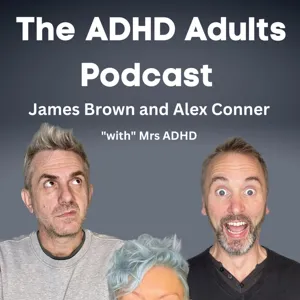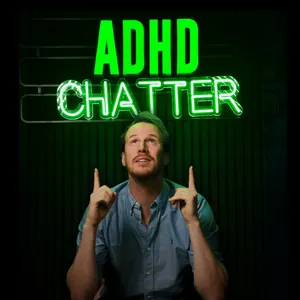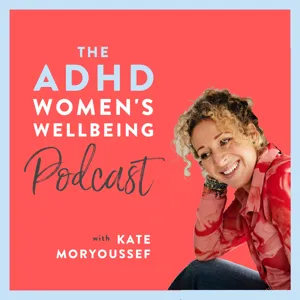Podcast Summary
James and Alex's Honest Discussions about ADHD Impact Listeners: Their candid conversations about daily struggles with ADHD on the ADHD Adults Podcast have made a positive impact on listeners in over 108 countries, providing a platform for open conversation and support.
Despite the unprofessional banter and occasional disagreements between James and Alex on the ADHD Adults Podcast, their open and candid discussions about their daily struggles with ADHD have made a positive impact on their listeners. A listener named Carol even shared how their honesty and humor helped her in her own ADHD acceptance. The podcast, which is listened to in over 108 countries, has a dedicated following, with messages like "Alex, you're a legend" being a testament to their influence. While James may have had his moments of anger and frustration, the podcast continues to provide a platform for open conversation and support for adults with ADHD.
The Harm of Internalized Stigma for Individuals with ADHD: Internalized stigma can lead to decreased self-esteem, self-confidence, and self-worth for individuals with ADHD. Young adults are particularly affected by external bullying and negativity, which can result in internalized stigma and distress. To combat self-stigma, focus on accurate information, resources, self-compassion, and self-acceptance.
Internalized stigma, or self-stigma, can be even more harmful for individuals with ADHD than external stigma. Self-stigma occurs when we believe and internalize negative stereotypes about ADHD, leading to decreased self-esteem, self-confidence, and self-worth. Research suggests that young adults, in particular, are affected by external bullying and negativity, which can lead to internalized stigma and distress. To combat self-stigma, it's essential to listen to and engage with the ADHD community, but also to do the opposite of what we're told. Instead of believing the negative stereotypes, we should focus on seeking out accurate information and resources, and practicing self-compassion and self-acceptance. By recognizing and challenging our internalized stigma, we can begin to break free from the negative self-talk and build a stronger sense of self-worth.
Addressing Internalized Stigma through Evidence-Based Therapies: Internalized stigma, caused by the internalization of external stigma, can negatively impact mental health. Seeking professional help, like CBT therapy, can effectively address this issue. Remember, self-stigma arises from external stigma, and everyone deserves validation and understanding.
Internalized stigma, which can significantly impact mental health, may be effectively addressed through evidence-based therapies like Cognitive Behavioral Therapy (CBT). This is particularly relevant for individuals with low self-esteem, who often give more weight to the opinions of others over their own valid thoughts and experiences. The root cause of self-stigma and external stigma is the same, and both require attention and different approaches. It's essential to remember that self-stigma arises from the internalization of external stigma and that everyone deserves validation and understanding. The discussion also highlighted the importance of seeking professional help, such as a therapist, to navigate the complexities of mental health and self-stigma. Additionally, it's important to recognize that cultural references and personal experiences can shape our perspectives and understanding of the world around us. In conclusion, internalized stigma is a serious issue that can impact mental health, and seeking professional help, such as CBT therapy, can be an effective way to address it. Remember that self-stigma arises from the internalization of external stigma, and it's essential to validate our own experiences and thoughts while seeking understanding and support from others.
Fear of turning into a 'dull robot' prevented man from seeking ADHD diagnosis: Stigmas and misconceptions about ADHD treatment can hinder individuals from seeking help, emphasizing the importance of education and accurate information.
Internalized stigmas and misconceptions about ADHD and its treatment can prevent individuals from seeking a diagnosis and receiving the help they need. The speaker in this conversation shared how he believed that taking medication for ADHD would turn him into a "dull robot," despite not fully understanding the benefits and effectiveness of the medication. This belief, rooted in stigma, hindered him from pursuing a diagnosis for several years. It's crucial to challenge and educate ourselves about the facts surrounding ADHD and its treatment to ensure that those who may benefit from a diagnosis and support are not deterred by unfounded fears or misconceptions.
Internal stigma and self-criticism in ADHD: People with ADHD may face internal stigma, leading to harsh self-talk and negative thoughts, even with progress and success. Medication use can also carry stigma. Acknowledging these feelings and practicing self-compassion is essential.
Individuals with ADHD, including those who have accepted their diagnosis and made progress, still face internal stigma and self-criticism. This can manifest as harsh self-talk and negative thoughts, particularly in new situations or when under pressure. Additionally, there is often stigma attached to the use of medication to manage ADHD symptoms. These internal struggles can be complicated and may surface unexpectedly, even when individuals are generally happy and successful in their personal and professional lives. It's important to acknowledge these feelings and work on self-compassion and acceptance.
Living with ADHD: Embracing the Reality: Recognize societal expectations and self-doubt can impact those with ADHD, but aligning with strengths and embracing reality can lead to acceptance and success.
Living with ADHD comes with its own unique challenges, including internalized stigma and self-doubt. The speaker shares her experience of questioning her legitimacy of having ADHD due to societal expectations and her own accomplishments. She acknowledges the importance of recognizing that even those who appear to have their ADHD under control still face struggles. The speaker emphasizes the importance of aligning oneself with what one can do and avoiding situations where self-stigma may be a factor. Ultimately, she encourages embracing the reality of living with ADHD and the importance of understanding that everyone, regardless of their diagnosis, has their own battles to face.
The Forgetfulness of ADHD Leads to Unexpected Challenges and Clutter: People with ADHD may forget items and internalize negative self-talk, leading to unnecessary purchases and clutter. It's important to be kind to ourselves and communicate effectively to manage symptoms.
Living with ADHD can sometimes lead to unexpected challenges and forgetfulness, as illustrated by the discussion about losing track of items like scissors. This forgetfulness can result in unnecessary purchases and clutter in one's home. Additionally, people with ADHD may internalize stigma and negative self-talk, as demonstrated in the conversation about forgetting important items at the supermarket. It's important to remember that everyone makes mistakes, and having ADHD doesn't make one a "freak" or a "pair of twats." Instead, it's essential to be kind to ourselves and acknowledge the unique challenges we face. Furthermore, the conversation highlighted the importance of communication and support in managing the symptoms of ADHD.
Accepting the reality of ADHD and overcoming internalized stigma: Recognize and emotionally accept ADHD traits, challenge negative thoughts, and write a letter to oneself to counteract stigma. Remember, thoughts aren't real.
Accepting the reality of ADHD and overcoming internalized stigma is crucial for individuals, regardless of whether they have a diagnosis or not. Alex emphasized the importance of emotionally acknowledging one's ADHD traits and recognizing that they are valid. He also suggested writing a letter to oneself as a tool to counteract negative thoughts and stigma. Alex added that thoughts aren't real, and just because we think something doesn't make it true. By acknowledging and challenging these negative thoughts, individuals can work towards accepting and embracing their ADHD.
Our internalized stigma and negative thoughts about diagnoses are not real: Remember the validity of our diagnoses and the effort put into obtaining them. Monzo Bank stands out as neurodivergent-friendly, offering support for potential overspending or impulse control issues.
Our internalized stigma and negative thoughts about our diagnoses, such as ADHD, are not real and can be changed. Maria, a friend of a charity, reminded us that these thoughts are not from real people but our own brains. It's common for people to worry they tricked their psychiatrist into giving them a diagnosis, but the evidence and long diagnostic process prove otherwise. It's important to remember the validity of our diagnoses and the effort put into obtaining them. Additionally, Monzo Bank stands out as neurodivergent-friendly, actively asking questions about how ADHD affects individuals and offering support for potential overspending or impulse control issues. This proactive approach sets Monzo apart from other banks.
Monzo Bank: A Considerate Option for Individuals with ADHD: Monzo Bank, known for its user-friendly design and neurodivergent accommodations, is a top choice for individuals with ADHD seeking a digital banking service.
Monzo Bank, a digital banking service, stands out as a considerate option for individuals with ADHD due to its user-friendly design and serious approach towards accommodating neurodivergent needs. This was a topic discussed in episode 37 of the ADHD Adults podcast, where the hosts delved into the internalized stigma surrounding ADHD and shared personal experiences. During the conversation, it was mentioned that Monzo was compared to the character of Kermit the Frog, or "the muppets," due to its commitment to accessibility. Despite the common perception that financial institutions may not prioritize neurodivergent individuals, Monzo has made efforts to be inclusive. If you or someone you know has ADHD and is considering a change in banking services, Monzo is worth checking out. For more information or to engage with the ADHD Adults community, follow them on Instagram (@adhdadultuk) or Twitter (@adhdadultuk).




